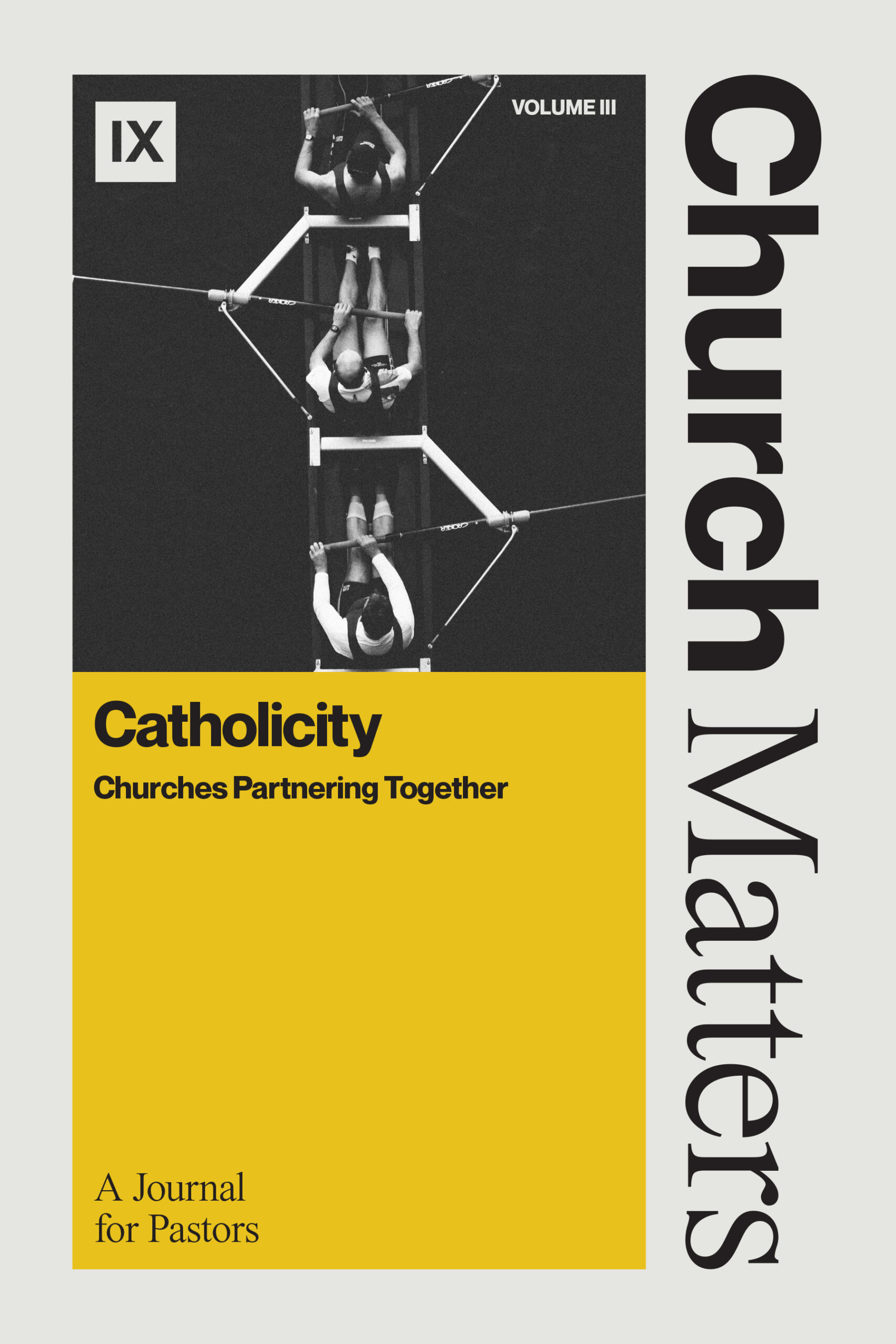The Internet and Christian Catholicity
Take a moment to consider how you would respond to these questions:
1) What is the biggest issue facing the church today?
2) Where are Christians most tempted to compromise the truth?
3) How should pastors help their people be effective witnesses for the gospel?
Maybe you have answers to each, but you might also notice how vague the questions are. Question 1 gives no indication of what I mean by “the church” or the “biggest” issue. Question 2 doesn’t specify which kinds of Christians or which particular truth might be compromised. Question 3 fails to qualify what kinds of pastors should give what kind of help to which kind of people. Each question is misleading because every Christian, church, and pastor lives in a specific context. They are embodied persons existing in particular places and times. They experience particular needs and crises.
It’s increasingly difficult to remember our particularity in the digital age. The Internet leads to “context collapse.” It places into a space that is intrinsically faceless and lacks geographic borders. That space generalizes language and thought, ignores the very real differences between people and places, and pushes us toward highly generic ways of speaking and thinking.
The Internet does have its positives. For example, as a husband and father living in Kentucky who attends a Southern Baptist Church, my normal day-in, day-out life does not bring me into close contact with British evangelicals. Yet social media does. I can get to know people far removed from my own cultural context, allowing me to become aware of what people united to me in the gospel experience and how they respond.
At the same time, the Internet’s generalization of our thinking and language can misshape our instincts in significant ways. I can become more attentive to the problems or controversies that I see online than I am to my own temptations and weaknesses or those of my fellow church members. These dramas may have little to do with the people I live among, but their accessibility creates an illusion of proximity: they feel closer to me than they actually are because the distance between us has been “collapsed” through technology.
DEFINING FELLOWSHIP DOWN
The challenge of context collapse is particularly relevant for thinking about Christian catholicity. To the degree that theological discourse, pastoral care, and even the local church itself have migrated to the Web, they have become subject to distinctly digital dynamics. “Virtual church” is not just ecclesiologically incoherent; it’s deeply antithetical to the spirit of Christian catholicity.
This is true at a very basic level. A “virtual church” seeks to eliminate the physical realities that tend to push churches toward one another. One church cannot partner with another church for the sake of reaching the community because a virtual church has no community in the first place.
Yet the discontinuity between catholicity and digitalization is true at deeper levels, too. Digital habitats have a way of dominating our attention and emotional energy in a way that makes our actual lives and ministries feel dull or meaningless. A pastor whose thoughts are continually occupied with the latest arguments on social media or the newest trends in the blogosphere is almost certainly cultivating an illusory sense of community with certain online voices that feel close to him, but are actually quite far. In that way he experiences a kind of faux catholicity. On the flipside, he will likely develop a posture of hostility toward certain people or institutions based on how they sort themselves in these online skirmishes, even if he and those people or institutions are in substantial agreement on the major issues. What I have sometimes called “the view from Twitter” leads Christians to misread one another, preventing deep fellowship for often superficial reasons.
Genuine fellowship amongst Christians and between churches often comes from shared core convictions and a common purpose that is downstream from those convictions. This formula presupposes that Christians and churches can determine which convictions are most important for the purposes of partnerships (e.g., theological triage). It also presupposes that Christians and churches can connect those convictions to purposeful action.
Digital culture presents serious problems for both of these assumptions. It is in the Internet’s nature to make absolutely every issue a “critical” one, to constantly draw lines of fellowship not around what is most biblically essential but what is hottest and most “clickable.” It’s also in the Internet’s nature to be self-referential: to keep its members addicted to “doomscrolling” and consuming/posting more content, rather than logging off and doing something about what’s going on. Online, the boundaries of acceptable fellowship tend to become more and more arbitrary, and the cash value of fellowship is diluted to mean little more than consuming the same content.
CULTIVATING CATHOLICITY IN A DIGITAL AGE
How can churches and pastors cultivate genuine catholicity in the digital age?
Part of the answer is a pattern of resistance, particularly among pastors, against the allure of virtual “ministry.” Few people reading this article will be seriously considering planting a wholly digital church. But perhaps more may functionally live online, spending a portion of their week emotionally invested in the happenings of Christian social media and blogs.
The alternative to this is not throwing out laptops and phones. Rather, it’s a deliberate rhythm of putting digital technology in its proper place. This rhythm will look different from place to place, but one diagnostic measure of how well we are doing is to reflect on how we answer questions like those that started this article. When similar issues are posed, how easy is it to think of real people in the pews, real questions that our spouses, children, and friends deal with, rather than the latest viral disputation? Does a pastor’s preaching reflect his commitment to expositional teaching to this particular community, or does he tend to address his congregation as if they are something they’re not—say, a group of affluent coastal elites who read The New Yorker?
Resisting the temptations of digital context collapse empowers catholicity both positively and negatively. Positively, fixing our emotional energy on the people and institutions actually close to us fosters common cause. Instead of reducing people to digital opinion-machines, we get to know real people, with real experiences, fears, desires, and hopes. This may lead to surprising discoveries: that pastor or denominational leader whose Twitter thread we disliked may be coming at his perspective from an angle we never imagined. These embodied relationships may not result in a change of opinion, but many times they do result in a change of posture.
Negatively, resisting the Internet’s formative power can help us practice what I have come to call “holy ambivalence.” One of the worst effects of social media on evangelical culture has been the nonstop incentives and pressure for people who belong in one confessional tradition (say, a conservative one) to police the discourse and practices of people who belong in a completely different one (say, a progressive one). Not only is this a colossal waste of time, it paradoxically reinforces a sensation of faux-unity. Becoming outraged over what a remote denomination or parachurch ministry is doing implies we really ought to be united together. This is little more than an example of how the Internet creates a mirage of proximity.
In reality what progressive mainline writers and activists do or say does not affect me or my own church in the least. My response should tell the truth about this. “Holy ambivalence” is the practice of courteous indifference. I do not need to pretend there is unity where there is not. Instead, with love and respect, I can simply say, “There is no fellowship here.” And then I can move on, instead of practicing outrage over people and institutions I could never hope to change or influence. Holy ambivalence preserves Christian charity by removing the illusion of unity.
CONCLUSION
A digital world is a paradox: we are more connected and far-flung than ever, yet more prone to miss what is right in front of our faces. There is no turning the clock back. We can never return to a pre-Web age. Thus, faithfulness to Christ in this generation means fulfilling his Word for individual Christians and churches in the Internet era.
While technology itself pushes us away from Christian wisdom, we can push back. Christian fellowship is possible by his grace. But we must consciously work for it. It will not appear in our inbox or after we refresh our feed.
Related Multimedia

How to Use Prayer Meetings to Promote Catholicity
By Ben Lacey









